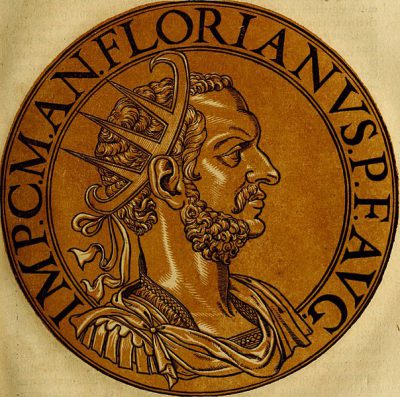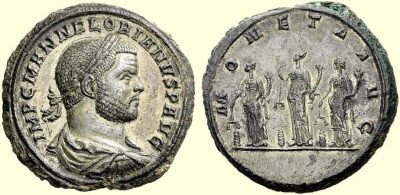Chapters
| Name | Marcus Annius Florianus |
|---|---|
| Ruled as | |
| Reign | July – September 276 CE |
| Born | after 200 CE |
| Died | September 276 CE |
After Aurelian was murdered, the military asked the Senate to name his successor. After several months of interregnum, the choice fell on Marcus Claudius Tacitus.
Tacitus appointed his stepbrother – Florianus – the Praetorium Prefect, and together they set off for Asia Minor, where the Goths and Alans, probably former mercenary soldiers from Aurelian’s army, sowed murder and destruction and plundered the population. The emperor’s expedition was quick and effective, and the threat was liquidated. However, shortly thereafter, in the spring of 276, Tacitus died, in circumstances not fully known. According to Zosimos, he was killed by conspirators.
The death of the emperor sparked another civil war, as the heir anointed in Rome – brother Tacitus Florianus was not recognized in the East – where Marcus Aurelius Probus seized power. According to Zosimos, the legitimate emperor remained loyal to the provinces from Cilicia to Italy, Gaul, Spain, all of Africa and the Moorish tribes.
Three Months of Florianus
Florianus reigned as Imperator Caesar Marcus Annius Florianus Augustus.
The new emperor was in Asia Minor. Before he went to trial with Probus, he pacified the Scythians on the Bosporus. He showed grace to the Scythian rebels by allowing the encircled people to return to their homes. Then he moved against Probus, who was trying to prolong the conflict because his strength was thinner. Florianus and his army camped in Tarsus, where he wanted to wait for the rebel and his army.
Probus’s tactics were working. The summer of 276 was exceptionally hot in Tarsus, and Florianus’ soldiers, mainly from Europe, were not used to such high temperatures. In addition, diseases began to spread in the army. When the information about the state of the imperial troops reached Probus, he decided to strike immediately and tip the scales of victory to his side. The enemy armies met at Tarsus, but apart from exchanging missiles, there was no short circuit and the forces of Florianus and Probus split.
Death
History has preserved various messages about the death of the emperor until our times, I will quote here the course of events given by Zosimos in his New History. According to the historian, after the unsettled battle, a group of Probus soldiers arrived at the Roman camp and, without being counteracted by Florianus’ soldiers (and probably with their approval), deprived Florianus of power and left him under the guard of his own people. The emperor attempted to regain power, but the usurper’s envoys soon returned and ordered the execution of Florianus on the imperial soldiers, which was immediately carried out.


